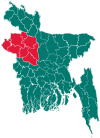Sariakandi Upazila
Sariakandi
সারিয়াকান্দি | |
|---|---|
 Kalitola Groyen Badh on the bank of Jamuna river. | |
 | |
| Coordinates: 24°53′N 89°34′E / 24.883°N 89.567°E | |
| Country | |
| Division | Rajshahi |
| District | Bogra |
| Government | |
| • M.P | Abdul Mannan |
| Area | |
• Total | 408.50 km2 (157.72 sq mi) |
| Population | |
• Total | 276,199 |
| • Density | 680/km2 (1,800/sq mi) |
| Time zone | UTC+6 (BST) |
| Postal code | 5830[3] |
| Area code | 05028[4] |
| Website | shariakandi |
Sariakandi Upazila (Bengali: সারিয়াকান্দি উপজেলা) is an upazila of Bogra District in the Division of Rajshahi, Bangladesh. Sariakandi Thana was established in 1886 and was converted into an upazila in 1983.[5] It is named after its administrative center, the town of Sariakandi.
Geography
[edit]Sariakandi Upazila has a total area of 432.55 square kilometres (167.01 sq mi). About three-fifths is land and two-fifths is water, chiefly the Jamuna River, which flows south through the upazila.[1] It is the easternmost upazila of Bogra District. It borders Sonatala Upazila to the west and north, Fulchhari Upazila of Gaibandha District to the north, Islampur, Madarganj and Sarishabari upazilas of Jamalpur District to the east, Kazipur upazila of Sirajganj District to the southeast, Dhunat Upazila to the south, and Gabtali Upazila to the west.[5][6]
Demographics
[edit]| Year | Pop. (000) | ±% |
|---|---|---|
| 1981 | 199 | — |
| 1991 | 230 | +15.6% |
| 2001 | 240 | +4.3% |
| 2011 | 271 | +12.9% |
| 2022 | 276 | +1.8% |
| Source: Bangladesh Bureau of Statistics[1] | ||
According to the 2011 Census of Bangladesh, Sariakandi Upazila had 75,614 households and a population of 270,719. 66,938 (24.73%) were under 10 years of age. Sariakandi had a literacy rate (age 7 and over) of 36.94%, compared to the national average of 51.8%, and a sex ratio of 1001 females per 1000 males. 18,543 (6.85%) lived in urban areas.[1][8]
Administration
[edit]Sariakandi Upazila is divided into Sariakandi Municipality and 12 union parishads: Bhelabari, Bohail, Chaluabari, Chandan Baisha, Fulbari, Hat Sherpur, Kamalpur, Karnibari, Kazla, Kutubpur, Narchi, and Sariakandi. The union parishads are subdivided into 100 mauzas and 173 villages.
Sariakandi Municipality is subdivided into 9 wards and 17 mahallas.[1]
Education
[edit]There are five colleges in the upazila. They include Chandan Baisha Degree College, founded in 1964, Chhaihata Degree College, and Shariakandi Degree College.
Jamthol Technical Management College, founded in 2001, is one of the upazila's two colleges in the technical and vocational education system.[5]
The madrasa education system includes three fazil madrasas.[9]
Anushilon pre-cadet & high school founded in 2000 is one of the best kindergarten school for its curiculam, activities & result.
See also
[edit]References
[edit]- ^ a b c d e "Bangladesh Population and Housing Census 2011 Zila Report – Bogra" (PDF). bbs.gov.bd. Bangladesh Bureau of Statistics.
- ^ National Report (PDF). Population and Housing Census 2022. Vol. 1. Dhaka: Bangladesh Bureau of Statistics. November 2023. p. 401. ISBN 978-9844752016.
- ^ "Bangladesh Postal Code". Dhaka: Bangladesh Postal Department under the Department of Posts and Telecommunications of the Ministry of Posts, Telecommunications and Information Technology of the People's Republic of Bangladesh. 21 October 2024.
- ^ "Bangladesh Area Code". China: Chahaoba.com. 18 October 2024.
- ^ a b c Rahman, Md. Hafizur (2012). "Sariakandi Upazila". In Islam, Sirajul; Jamal, Ahmed A. (eds.). Banglapedia: National Encyclopedia of Bangladesh (Second ed.). Asiatic Society of Bangladesh.
- ^ "Sariakandi Map". Sariakandi Upazila. Retrieved 11 July 2014.
- ^ Population and Housing Census 2022 - District Report: Bogura (PDF). District Series. Dhaka: Bangladesh Bureau of Statistics. June 2024. ISBN 978-984-475-235-1.
- ^ "Community Tables: Bogra district" (PDF). bbs.gov.bd. Bangladesh Bureau of Statistics. 2011.
- ^ "List of Institutions". Ministry of Education. Retrieved July 15, 2014.

